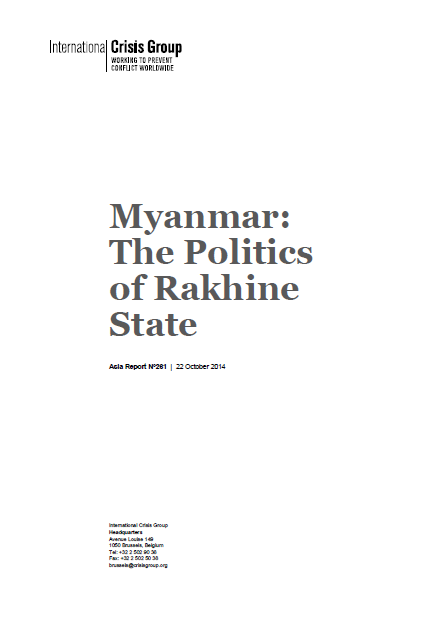Posts Tagged ‘International Crisis Group’ (10 found)
Myanmar’s Peace Process: A Nationwide Ceasefire Remains Elusive
After more than six decades of internal armed conflict, the next four weeks could be decisive for Myanmar’s peace process. The process, which was launched in August 2011, enjoyed significant initial success, as bilateral ceasefires were agreed with more than a dozen ethnic armed groups […]
• • •Myanmar: The Politics of Rakhine State
The situation in Rakhine State contains a toxic mixture of historical centre-periphery tensions, serious intercommunal and inter-religious conflict with minority Muslim communities, and extreme poverty and under-development. This led to major violence in 2012 and further sporadic outbreaks since then. The political temperature is high, and likely to increase as Myanmar moves closer to national elections at the end of 2015. It represents a significant threat to the overall success of the transition, and has severely damaged the reputation of the government when it most needs international support and investment. Any policy approach must start from the recognition that there will be no easy fixes or quick solutions. The problems faced by Rakhine State are rooted in decades of armed violence, authoritarian rule and state-society conflict. This crisis has affected the whole of the state and all communities within it. It requires a sustained and multi-pronged response, as well as critical humanitarian and protection interventions in the interim […]
• • •Media Release – Myanmar: The Politics of Rakhine State
The highly volatile situation in Myanmar’s Rakhine State adds dangerously to the country’s political and religious tensions. Long-term, incremental solutions are critical for the future of Rakhine State and the country as a whole […]
• • •Calls for DFID Burma Census Inquiry Top 1,000
More than a thousand people have written to Justine Greening, Secretary of State for International Development, calling for an inquiry into why the Department for International Development (DFID) spent 10m on Burma’s disastrous census earlier this year. DFID has not yet responded to these calls […]
• • •Not a Rubber Stamp: Myanmar’s Legislature in a Time of Transition
Myanmar’s new legislature, the Union Assembly formed in 2011 on the basis of elections the previous year, has turned out to be far more vibrant and influential than expected. Both its lower and upper houses have a key role in driving the transition process through the enactment and amendment of legislation needed to reform the outdated legal code and are acting as a real check on the power of the executive.
Yet, some bills moving through the legislature have raised concerns that the authorities, both legislative and executive, may not be ready to give up authoritarian controls on the media, on civil society organisations and on the right to demonstrate. More broadly, the role of the 25 per cent military bloc and its impact on the legislature have been questioned. Serious individual and institutional capacity constraints and unclear procedures serve as a brake on effective, efficient lawmaking […]
• • •Not a Rubber Stamp: Myanmar’s Legislature in a Time of Transition
In its latest briefing, Not a Rubber Stamp: Myanmar’s Legislature in a Time of Transition, the International Crisis Group looks at Myanmar’s Union Assembly, formed in 2011 and the first independent such body the country has seen in half a century. Both its lower and upper houses have shown some strengths and are important drivers of the transition process. However, they sometimes struggle to develop technically sound and democratically oriented laws […]
• • •The Dark Side of Transition: Violence Against Muslims in Myanmar
In its latest report, The Dark Side of Transition: Violence against Muslims in Myanmar, the International Crisis Group examines the recent violence against Muslim communities. Anti-Muslim violence is nothing new in Myanmar but has been growing in the past two years, the product of reduced authoritarian controls and a history of intolerant Burman/Buddhist nationalism. Issued on the day President Thein Sein begins a visit to Rakhine State, the centre of much violence, this report urges a stronger government effort to combat bigotry and protect its Muslim population […]
• • •A Tentative Peace in Myanmar’s Kachin Conflict
On 30 May 2013, the Kachin Independence Organisation (KIO) signed a tentative peace agreement with the Myanmar government – the last of the eleven major ethnic armed groups to do so since 2011. This represents a major opportunity to secure lasting peace in Kachin State, and in the country as a whole. Yet, there will be significant challenges in doing so. Key issues still need to be discussed and agreed, including the repositioning of troops from both sides to reduce the chance of clashes, a monitoring mechanism, and a meaningful political dialogue. Major steps need to be taken to develop an equitable peace economy, and the exploitation of Kachin’s significant natural resources, if not appropriately regulated, could compound inequalities and trigger renewed conflict. Much remains to be done to avoid a repeat of the failures of the previous ceasefire process […]
• • •China’s Myanmar Strategy: Elections, Ethnic Politics and Economics
As Myanmar approaches its first elections in two decades, China’s primary concerns are the security and stability of its south-western border and protecting its strategic and economic interests in the country […]
• • •The Myanmar Elections
Twenty years ago today, Aung San Suu Kyi’s party swept Myanmar’s elections, but the army refused to allow the results to be implemented. Later this year Myanmar will vote again in a process certain to be seriously flawed but whose results and the constitution to be brought into force will redefine the political landscape, influencing opportunities to push for long-overdue social, economic and political reforms.[…]
• • •









 All posts
All posts